In the middle of the whole debate about Agora and its reform, there are people that simply fell in love with our statutory event from the beginning and want to explore all its opportunities. One of them is Erika Bettin from AEGEE-Verona, who is candidating for (Vice)Chairperson of the Agora.
The AEGEEan: You work as a journalist, you cooperate with The AEGEEan, you are studying at university, on top of that the Chair Team. How do you manage to do everything? Do you think you will have enough time to devote to the preparation of Agora Catania?
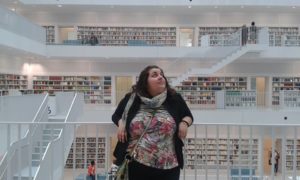 Erika: It sounds like I have a busy life [she smiles, ed.]. Indeed, it is not always easy to manage everything and the fact that I came back to school was one of the main reasons of concerns in Chișinău. Once I had my study plan clear, I applied for the Open Call, because I was 100% sure that the dates of both Agorae and my studies (exams, lessons, thesis) would not clash. For now I am lucky enough to do most of my job via remote with few weekly meetings, therefore I am able to tailor my daily schedule based on the various commitments I might have. Throughout my AEGEE life I always managed well to organise myself between the contribution to our association and my daily job. Of course, time management is a refined art and it happened that I was running last minute for deadlines, but I try to limit it at the minimum. The path to Agora Catania is undoubtedly challenging time-wise, but I am planning to keep in place (if not improve) the system we have within the Chair Team now. I must admit that I was extremely lucky working with Marta because we both were very clear and honest with each other regarding our commitments and our internal task division evolved naturally. I believe that when you are not working full time for AEGEE, firstly you need to be able to organise yourself meticulously, and then you need to be clear with your team about your availability in order to have everything always under control, but mostly team members are not overloading with your tasks.
Erika: It sounds like I have a busy life [she smiles, ed.]. Indeed, it is not always easy to manage everything and the fact that I came back to school was one of the main reasons of concerns in Chișinău. Once I had my study plan clear, I applied for the Open Call, because I was 100% sure that the dates of both Agorae and my studies (exams, lessons, thesis) would not clash. For now I am lucky enough to do most of my job via remote with few weekly meetings, therefore I am able to tailor my daily schedule based on the various commitments I might have. Throughout my AEGEE life I always managed well to organise myself between the contribution to our association and my daily job. Of course, time management is a refined art and it happened that I was running last minute for deadlines, but I try to limit it at the minimum. The path to Agora Catania is undoubtedly challenging time-wise, but I am planning to keep in place (if not improve) the system we have within the Chair Team now. I must admit that I was extremely lucky working with Marta because we both were very clear and honest with each other regarding our commitments and our internal task division evolved naturally. I believe that when you are not working full time for AEGEE, firstly you need to be able to organise yourself meticulously, and then you need to be clear with your team about your availability in order to have everything always under control, but mostly team members are not overloading with your tasks.
We have seen in previous Agoras that the Chair Team often needs to manage the unexpected, while keeping an eye on the timetable. What’s your strategy to prepare for that?
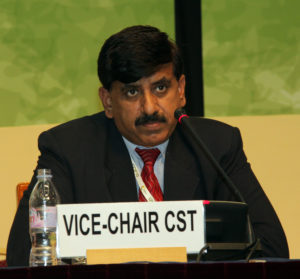
Erika coping with stress during the Agora
The first thing to do, in my opinion, is to prepare a flexible agenda, allocating if possible some spare time in order to have enough time in case discussions prolongs or some unexpected points of discussion are raised or added. Then, I would say come prepared and analyse the agenda and current happenings in AEGEE to “sniff” potential disagreements or heated arguments. One thing I personally like to do is treating any item on the Agenda as a possible Armageddon, so I am mentally ready that something may or may not happen. It is important also to have several backup plans to be put in action if need be. While at the Agora, to face the unexpected a Chair should have a good amount of cold blood, quick thinking and be clear to the participants when things happens.
You presented your candidature for being Chairperson before, but you didn’t get elected, and that can impact motivation greatly. How did you decide to keep on trying?
Eh. This is a nice question. As you correctly mentioned not being elected twice did have an impact not only on my motivation, but also on my perception of the association. In Agora Zaragoza, it was very clear that my chances were thin, therefore I took it as a precious lesson to learn. It motivated me to be more active and I think in 2014 I reached my climax in the association, when I was hungry to learn and experience. Agora Cagliari non-election was harder to digest, I kept on asking myself what I did wrong and why my love for Agora was not mutual. At the same time, few months later I found my place within The AEGEEan and joining AEGEE-Verona gave me new lymph and a renewed energy and willingness to contribute to both. I believed that motivation is a cycle and last summer it hit the lowest point. Maybe it was the fact that I put half of the hemisphere between me and my life putting everything into the right perspective, or maybe the fact that taking a break from laptop, emails, chats was refreshing… I don’t know, but when the open call was sent, I felt that it was worth a try. I won’t be active as much as I can be now for long, and in this sunset boulevard of my AEGEE life I wanted to do something that would make me happy. After all, this is all volunteering is about: finding your passion and working for it.
You have been a member of the Agora Reform Task Force and the Agora Observation Mission, now you are fully involved in the Chair Team. Name one thing you would radically change about Agora and explain why.
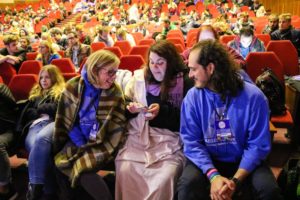 It is a recurring question to candidates for (Vice)Chairperson, but then you discover how little margin of movement you have. You cannot propose anything, unless you are involved in the discussion with another body, and you cannot reply to questions such as: Do you agree with this proposal?. We are already changing something within the Chair Team and the Agora Reform Task Force, but if you ask for something radical I would mention one thing: how we perceive Agora. Our general assembly is by definition a place where we decide things. In fact, in its working format mostly verbs such as “approve”, “elect”, “ratify” are used, because at the end of the day Agora is an administrative body. As it is now, it’s not a place to meet with friends, it’s not a budget sleeping location to allow you to visit the city and its surrounding. Is it boring? Perhaps. But why? Currently we have this humongous hybrid between an administrative body and a thematic one, where both parts are neglected always running out of time and making the impossible task to please everybody or every aspect of our organisation.
It is a recurring question to candidates for (Vice)Chairperson, but then you discover how little margin of movement you have. You cannot propose anything, unless you are involved in the discussion with another body, and you cannot reply to questions such as: Do you agree with this proposal?. We are already changing something within the Chair Team and the Agora Reform Task Force, but if you ask for something radical I would mention one thing: how we perceive Agora. Our general assembly is by definition a place where we decide things. In fact, in its working format mostly verbs such as “approve”, “elect”, “ratify” are used, because at the end of the day Agora is an administrative body. As it is now, it’s not a place to meet with friends, it’s not a budget sleeping location to allow you to visit the city and its surrounding. Is it boring? Perhaps. But why? Currently we have this humongous hybrid between an administrative body and a thematic one, where both parts are neglected always running out of time and making the impossible task to please everybody or every aspect of our organisation.
Is this really how Agora should be? What if we decide that Agora is only administrative and we place there just the essentials: elections, reports and proposals? And about proposals, do we really need so many every Agora? If you look at the Agenda and remove things that are not procedural, Agora will last probably two days and a half. AEGEE is not only this, we have this wonderful and powerful thematic side. Then, how about doing one thematic Agora where we deal just with thematic topics, and one to be only administrative? But then the question is: what about EPM? Isn’t it our annual thematic conference and planning meeting? Shouldn’t we reinforce it?
Also, do we really need 800, 900, 1000 people when last time we didn’t have an extended open call for participants was in 2012? Do we really need so many participants when half of them are not actually in the facilities and one third of the remaining half is sleeping during all the sessions? Wouldn’t it be better to cut down the number of the attendees by half and have even only 400 of them but super active because they know that going to the Agora is not for everyone and they “fight” for it? Because they understand better their role and they are ready to question the status quo?
There are a lot of questions there, fruit of my six years in the association, questions that I know many active people are asking themselves too. Finding a solution is however very complicated, firstly because we are stuck in this bureaucratic spyral and then because we are human, therefore resistant to change. Maybe we should use another verb when it comes to the future of the Agora: not CHANGE but REVOLUTIONISE.
“My goal is to facilitate all the discussion during the Agora in a fair and objective manner, in order to make every opinion heard.” What’s the biggest challenge in that?
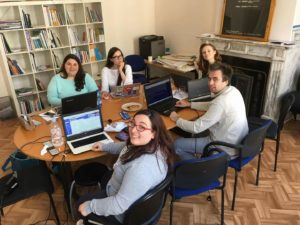
Chair Team Meeting in Brussels before Spring Agora Enschede
Everyone has an opinion and they want to tell it right away. I think this is the biggest challenge. While being an Agora participant, I also felt this urge to go on stage and have my say, but when two, three, 10, 50 people are doing the same, the result is confusing for everyone. The goal, then is to give appropriate amount of time to each speaker, balance objections and answers, recap every now and then and cut the discussion when it’s going too far or losing the focus.
How do you plan to solve possible conflicts arising among parties during the preparation of Autumn Agora Catania?
Getting everyone on the same page organising every aspect of the Agora is impossible because everyone has its own ideas and ways to implement. Being in the Chair Team requires a lot of skills in mediation and compromising, trying to accommodate all the possible requests and disagreements before they can evolve into conflicts. In case something arises, eventually the Chairperson always has the final decision on the Agenda, meaning that when needed Chair Team decisions can be reinforced over feedback or other solutions if they are not deemed necessary or appropriate. At the same time, you can avoid conflicts by listening to the suggestions that you received. After all, every idea is smart on paper, but then you need to take into account the general reception and be able to rethink it and eventually change it.
“During Spring Agora Enschede, we will launch a trial about sending questions online before the presentations for only a specific position, removing them from the plenary.” Could you tell us more about the trial and the reason behind it?
Currently the election system is Questions – Presentations – Restatement of unanswered questions. We wanted to try the online questions to save some precious time and engage more the online part of an Agora. The procedure is rather simple. During plenaries the Chair Team will open the floor for online questions and those will be uploaded to the open slides website we have been using for some Agorae via the option motion. Everyone at the registration desk will be given a password to log in to the website and with that password participants will be able to submit questions and candidates able to read them. Before the plenary ends, we will close also the possibility to ask questions. It will be a trial for this Agora, and of course we will be there in case any problem will arise. AEGEE-Enschede promised us internet won’t fail on participants (in case blame Derk, [she winks, ed.]), and we really hope it will be well received.
One recurring topic seems to be the lack of proper KT in AEGEE, and you as well mention this in your candidature. Have you given KT before and what is your strategy to ensure the process is smooth?
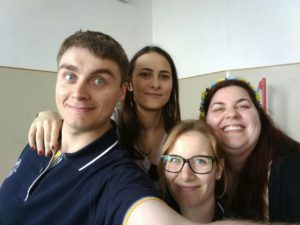
Erika with some members of her local AEGEE-Verona
I indeed gave and received KT and, in the various team, I had the opportunity to experience both lacking (if no) KT and effective one. It is physiological that, when a team finishes its term, some competences are lost, but in our association there is a severe lack of knowledge management, that is why I put it as one of the point of my programme. Within the Chair Team of Spring Agora Enschede, I have experienced a very great management of knowledge transfer from former Chairperson to us, he has been always available for questions and doubts. Also, Marta is at her third Agora preparation, therefore she has more competences and a background experience. This means that whenever I ask even the silliest question she is there to explain or guide the team into the procedure. From Agora Catania to the next Spring Agora, the new Chair team will have at least seven months (assuming, for instance, that Agora will be in April) to prepare themselves and this will give me and my fellow CT members plenty of time to have a deep KT, going through agendas, procedures, system, habits, best practices etc. Also, I will make sure that they can count on us while preparing Spring and Autumn Agora 2018.
You can read her full candidature here.
Written by Federica Soro, AEGEE-Cagliari

